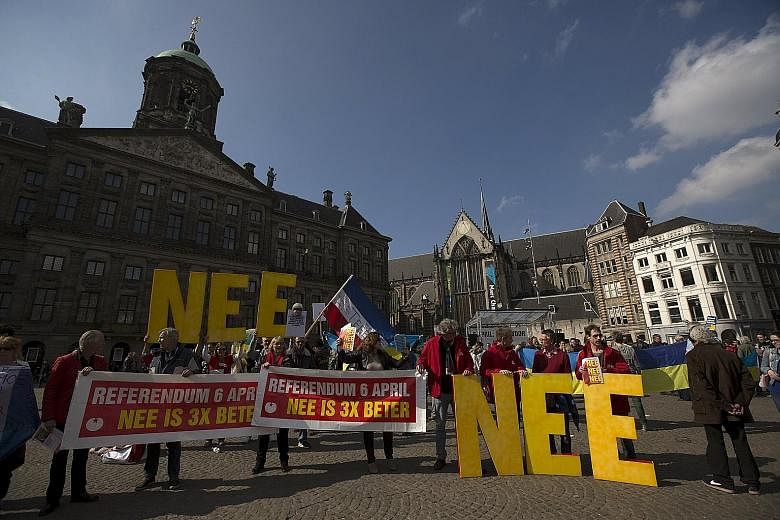LONDON • Two months before Britain faces a crucial vote on whether to stay in the European Union, the outcome may, perversely, be decided by another referendum today in the Netherlands.
In theory, the two ballots have little in common. The Dutch are not called upon to rule on the EU's future - they are merely voting on an EU free trade deal with Ukraine.
And, unlike the British referendum whose results are binding on the government, the Dutch vote is merely advisory for the country's authorities.
Nevertheless, if the Dutch choose to reject their government's recommendation by giving the thumbs down to the Ukraine deal, that could embolden voters in Britain to defy their politicians and pull the country out of Europe.
Today's Dutch referendum is very much part of a mounting Europe-wide backlash against the continent's political establishment.
Since any deal with Ukraine incurs Russia's wrath and also because Ukraine's graft-plagued economy remains severely handicapped, the EU deal with the country is modest: It eases trade, but offers Ukraine no guarantee of future EU membership and does not grant Ukrainians the right to work in the union.
EU officials were stunned to discover that, alone among 28 member states, the Netherlands is encountering difficulties in accepting the document.
But the Dutch dispute is not about Ukraine - it is a proxy domestic battle over the Netherlands' future within the EU.
The prime mover behind today's referendum has been GeenStijl, a popular anti-establishment Dutch blog site whose name loosely translates as "no class" or "no style". It teamed up with two other EU-sceptic organisations in collecting the 300,000 signatures required to force a vote.
GeenStijl admits that it is using Ukraine only to force through "a real national EU referendum", similar to that offered to the British on June 23.
And because its initiative proved popular, domestic politicians of every stripe have jumped on its bandwagon. Mr Geert Wilders, leader of the nationalist, right-wing and anti- immigrant Party for Freedom, urges voters to reject the Ukraine treaty because it "means more Europe".
On the left of the political spectrum, the Socialists, the Netherlands' largest opposition party, want the Ukraine treaty dismissed because, allegedly, "it will benefit only multinational companies".
And then there is the Party for the Animals, which dislikes Ukraine because the country apparently fails to protect animal welfare. "Ukrainian eggs come from huge battery cages", party leader Marianne Thieme recently claimed in the local media.
Opinion polls indicate that up to 55 per cent of those questioned intend to reject the Ukraine deal. But all polling is unreliable, since about a quarter of the population remains undecided, while a further quarter claim to be unaware that a referendum is even taking place. The outcome depends entirely on today's turnout.
If the turnout is less that the legally mandated 30 per cent of the electorate, the referendum will be automatically disregarded as an expensive and irrelevant sideshow.
The Dutch government could also ignore the outcome if voter participation is below 50 per cent - mainstream politicians would argue that the vote lacks credibility if it represents the wishes of less than a majority of those entitled to vote.
But if more than half of the electorate do cast their ballots and the verdict is "no", it is difficult to see how the Dutch government can ratify the Ukraine treaty.
That will spell the demise of the entire document, since ratification of such treaties requires the unanimous approval of all 28 EU member states.
More significantly, a rejection in the Netherlands will embolden EU opponents in Britain who claim that, if the Dutch have the guts to reject one treaty, the British could do even better by rejecting the entire union.
A victory for naysayers in the Netherlands will also be interpreted as vindication for those in Britain who have long believed that they do not require serious arguments to persuade voters to leave the EU.
All they need is to follow the Dutch model of portraying the EU as a remote institution ruled by unelected bureaucrats who strike deals with unwanted poverty- stricken foreigners who, in turn, come to "steal" European jobs.
Fiction is, therefore, as good as facts. The Dutch referendum is a reminder that opposition to the EU is far from just a peculiar British syndrome.
"If the Dutch vote no, Europe will have a problem," European Commission president Jean-Claude Juncker recently admitted.
From a man famous for speaking his mind, this must be the understatement of the year.


